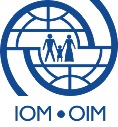| Mon. June 16, 2025 |
 |
|
||
|
||||
| ||||

International Affairs Forum: What is the assignment of the International Organization for Migration (IOM) Mission in Kosovo?
International Organization for Migration (IOM) Mission in Kosovo: IOM has been present in Kosovo since 1999 (following the conflict in Kosovo) as part of the overall efforts of the international community to invest in a durable peace process and assist the population in rebuilding their lives and working for the future. In the early years, IOM was the main actor in facilitating the return of displaced persons, and in recent years, IOM has shifted its work from short-term reconstruction and rehabilitation efforts to supporting longer-term development processes in Kosovo.
Our mission, as elsewhere with IOM globally, is to support all government and non-governmental actors in making safe and secure migration processes contribute towards the benefit of all.
Today, IOM Kosovo is implementing several programs that benefit Kosovars of all ethnicities by providing return and reintegration assistance, generating job opportunities, and improving the living environments in communities.
IA Forum: How has the IOM Mission in Kosovo assisted refugees and internally displaced persons affected by the Kosovo conflict?
IOM: The IOM Mission in Kosovo has, through a great number of return and reintegration programs, assisted the return and reintegration process of returnees displaced by the Kosovo conflict, from neighbouring countries as well as from the EU and North America. Since 1999, IOM has assisted a total of 211,802 voluntary returns, including massive voluntary returns in the immediate years following the conflict (IOM assisted 174,572 voluntary returns between 1999 and 2000 alone).
IOM Kosovo, in coordination with different governments, has developed several Assisted Voluntary Return and Reintegration programs for Kosovar returnees, giving special attention to vulnerable individuals and groups. Our work includes providing pre-departure counseling, transportation, reception and onward transportation to final destinations, and medical assistance in accordance with individual needs.
Though the overall economic possibilities available have improved immensely since the conflict, the opportunities available to members of non-majority communities have remained limited, where non-majority returnees are facing particular challenges to reintegrate in their place of origin. IOM has, through various reintegration projects, provided support to displaced ethnic minorities through the provision, construction, or re-construction of housing and income-generating projects, promoting employment and self-employment opportunities for returnees. Today, IOM programs like Return and Reintegration Kosovo IV (RRK IV) are facilitating the return and reintegration of members from non-majority communities (displaced persons in the region (DPRs) residing in Serbia, Montenegro and the former Yugoslav Republic of Macedonia (FYROM), internally displaced persons (IDPs) within Kosovo, and refugees recognized by the Office of the United Nations High Commissioner for Refugees (UNHCR) or host governments in Serbia, Montenegro and FYROM) by providing housing assistance and house reconstruction, food and non-food assistance packages, training and income generation grants, and investment in small scale infrastructure projects.
IA Forum: In response to the major issue of unemployment in Kosovo, Kosovo’s European Integration Minister, Bekim C¸ollaku, has stated that there is a need for young professionals to stay in the state and that “illegal migration should not be the solution.” What are the current social, political and economic mechanisms causing unemployment, particularly among young adults?
IOM: First and foremost, it is worth stating that as an inter-governmental organization, IOM does not take any positions on social or political debates within Kosovo society. However, considering that many of our programs strive to improve Kosovars’ job skills and ability to find meaningful employment, it is clear that one significant challenge to reducing unemployment is mobilizing investment in the key growth sectors of the economy. Remittances from the Kosovo diaspora, as well as international donor investments, remain critical components in keeping the economy stable, but larger investment flows are limited due to a lack of investor confidence.
During the implementation of the Support to Micro, Small, and Medium Enterprises Grants Project funded by the EU and Ministry of Trade and Industry, IOM learned from the awarded grantees that their predominant challenges in expanding production and increasing employment were a shortage of capital and access to affordable finance, and the limited availability of a skilled workforce.
Read the rest and more in the latest issue of International Affairs Forum, focusing on migration and statelessness, by clicking HERE.
| Comments in Chronological order (0 total comments) | |
| Report Abuse |
| Contact Us | About Us | Donate | Terms & Conditions |
|
All Rights Reserved. Copyright 2002 - 2025